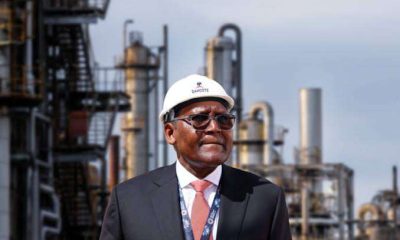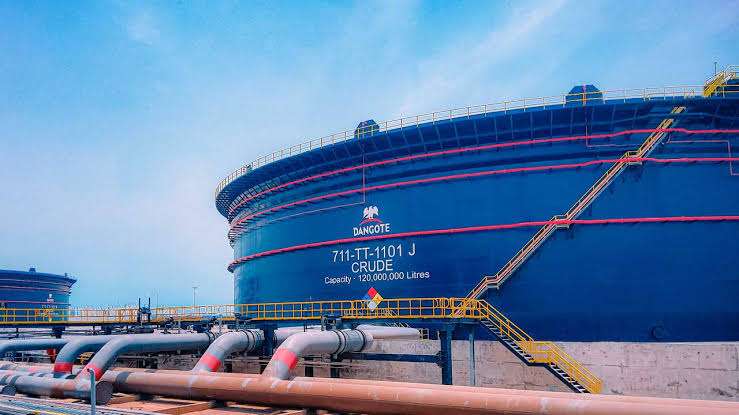Business
Expectations mount as Africa awaits Dangote Refinery

BY EMEKA EJERE
Amid soaring fuel costs occasioned by shortage of oil refineries across sub-Saharan Africa coupled with climbing crude prices sparked by the war in Ukraine, many countries now see Dangote Petroleum Refinery as the last hope of rescue in the face disturbing economic implications.
Recently, the Nigerian Midstream and Downstream Petroleum Regulatory Authority (NMDPRA) disclosed that the 650,000 barrel per day (bpd) Dangote Refinery, expected to be Africa’s biggest oil refinery and the world’s biggest single-train facility, is now 97 percent completed.
Refineries across sub-Saharan Africa combined can process 1.36 million barrels of oil a day, but with many not functioning only 30% of that capacity was used last year, according to independent consultancy CITAC. Just like four in South Africa, refineries in Cameroon, Ghana and Senegal are shut.
Withdrawal of International Oil Companies (IOCs) from refinery projects in Africa in recent years and failure of local investors and governments to plug the gap have led to a chronic lack of investment in modernising facilities.
Consequently, despite the continent’s estimated 125 billion barrels of oil reserves and 600 trillion cubic feet of natural gas, African countries rely almost exclusively on imported petroleum products to power their economies.
Speaking at the 16th Oil Trading and Logistics Expo in Lagos last week with the theme:
“Regulating Downstream Energy Transition in Dynamic Times,” the Chief Executive Officer of the National Petroleum Authority (NPA) of Ghana, Dr. Mustapha Abdul-Hamid, said the coming on stream of the Dangote Refinery would transform the Ghanaian downstream oil sector through the reduction in the cost of importation of petroleum products into the West African country.
Abdul-Hamid said the completion of the Dangote Refinery project would be a breakthrough for the West African region which has for a long time depended on importation of petroleum products.
He said Ghana was presently facing the challenge of continuous rise in the cost of petroleum products, adding that getting importers to turn their attention towards Nigeria, rather than going to the Netherlands for petroleum products importation would help his country stem the tide of continuous increase in the price of fuel.
He stated: “The Dangote Petroleum Refinery will have a huge impact on Ghana’s downstream sector. Right now, Ghana’s downstream industry is completely deregulated. There is no petrol subsidy in Ghana. For a deregulated market where the importers recover their costs fully, importing from Nigeria will certainly be more cost-effective and cheaper than importing from Rotterdam in the Netherlands where we get the bulk of our fuel in Ghana.
“As we all know, the price builds up for a liter of fuel will include the cost of shipment, transportation, insurance, and others, but if we are importing from Nigeria into Ghana, this will bring down the cost of fuel in our country. Ghanaians are very excited about the prospect of the Dangote Petroleum Refinery.
“Ghana had in the past built a good relationship where we get petroleum products from Nigeria at a reasonable and more affordable cost. I believe that the coming on stream of Dangote Petroleum Refinery will further strengthen the existing relationship between Nigeria and Ghana.”
Strengthening the naira
It is expected that once the refinery commences production, the pressure on Nigeria’s currency will reduce, with significant inflow of forex expected to come in through sales from the refinery.
Chief Executive of NMDPRA, Mr. Farouk Ahmed, recently reiterated the importance of the Dangote petroleum Refinery to the country while assuring that the Authority would give all necessary support to ensure timely completion and kick-start operations.
The NMDPRA boss spoke when representatives of the Dangote Petroleum Refinery visited the agency in Abuja to present the work plan for the facility for 2022/2023 in line with regulatory requirements.
“Today, representatives of the Dangote Refinery and Petrochemicals presented their 2022/2023 work plan to the Authority which showed that the refinery project is estimated to be at 97 percent completion
“The refinery, with 650,000 barrels per-day installed capacity expected to double the total output of Nigeria’s existing ailing refining infrastructure and meet 100 percent of the Nigerian requirement of all refined products will pump out fuel any moment soon,” the NMDPRA declared.
The Group Executive Director, Strategy, Portfolio Development & Capital Projects, Dangote Industries Limited, Mr. Devakumar Edwin said the refinery would stimulate economic development in Nigeria, adding that “it can meet 100 per cent of the Nigerian requirement of all liquid products (Gasoline, Diesel, Kerosene and Aviation jet), and also have surplus of each of these products for export.
“The high volume of petrol output from the refinery would transform Nigeria from a petrol import-dependent country to an exporter of refined petroleum products,” he stated, adding that the refinery would produce Euro-V quality gasoline, diesel, jet-fuel, kerosene and poly-propylene for local consumption and also have surplus of each of the products for export.”
On employment generation, he disclosed that, over 30,000 people are currently working at petroleum Refinery project sites through various contractors, noting that when operational, the refinery will generate over 100,000 direct and indirect jobs for the youths.
On local content development, Edwin said, the company had trained over 600 artisans selected from the host communities in the areas of masonry, AC electricians, plumbing, welding, iron bending and auto mechanics.
Speaking during an interview at the last International Monetary Fund meeting in Washington Dc, the governor of the Central Bank of Nigeria (CBN), Godwin Emefiele, said Dangote Refinery will reduce Nigeria’s import bill on petroleum products and other commodities by 40 percent.
Emefiele said, “With Dangote Refinery coming up with the 650,000 barrel per day, hopefully by the end of the year, that will reduce the demand for foreign exchange that normally will go for the importation of petroleum products.
“I have also said that between the importation of refined petroleum products and other products like rice, sugar and wheat, we spend close to about 40 per cent of the foreign exchange that is needed to fund imports into Nigeria.
“And if we find, for instance, a situation whereby around the end of this year, we no longer need foreign exchange to import petroleum product, rice or maize, I believe that the demand will drop. And as the demand drops, I believe that whatever supply we have is able to match the demand; and then we can see a stable exchange rate.”
Checks by Business Hallmark showed that a dollar went for as high as N895 on the black market on Thursday, despite several raids by the operatives of the Economic and Financial Crimes Commission (EFCC), in Lagos, Kano and Abuja.
Also, the Minister of Aviation, Hadi Sirika, recently said the scarcity of jet A1 and its high cost will persist in the nation until the Dangote and Port Harcourt refineries begin operation. According to him, the issues surrounding aviation fuel will only be resolved sustainably after these refineries come online.
President of the African Development Bank (AfDB), Akinwumi Adesina recently described Dangote Refinery and Fertiliser projects as the best industrialised project to happen to Africa.
He said these projects, which are far beyond the expectation of his team and himself, would positively affect the economic growth and development of not only Nigeria but Africa as a continent.
A report by Moody’s, one of the leading global rating agencies, on the state of Nigeria’s fiscal and external position, stated that when it comes on stream, the Dangote Refinery would lead to a modest improvement in Nigeria’s current account.
Stressing that the position was reached with the projection that Nigeria would stop the importation of petrol, the report noted that the gain would mostly arise from savings on transportation costs.
“Dangote Refinery will improve Nigeria’s current account modestly when fully operational. Substituting imported refined petroleum by domestic products will save current transport cost and other related costs on an import bill that reached $14 billion in 2021,” Moody’s said.
“Indeed, while Nigeria would no longer need to import refined petroleum, it would also lower the country’s export of crude oil since a part of the production would be used domestically.”






